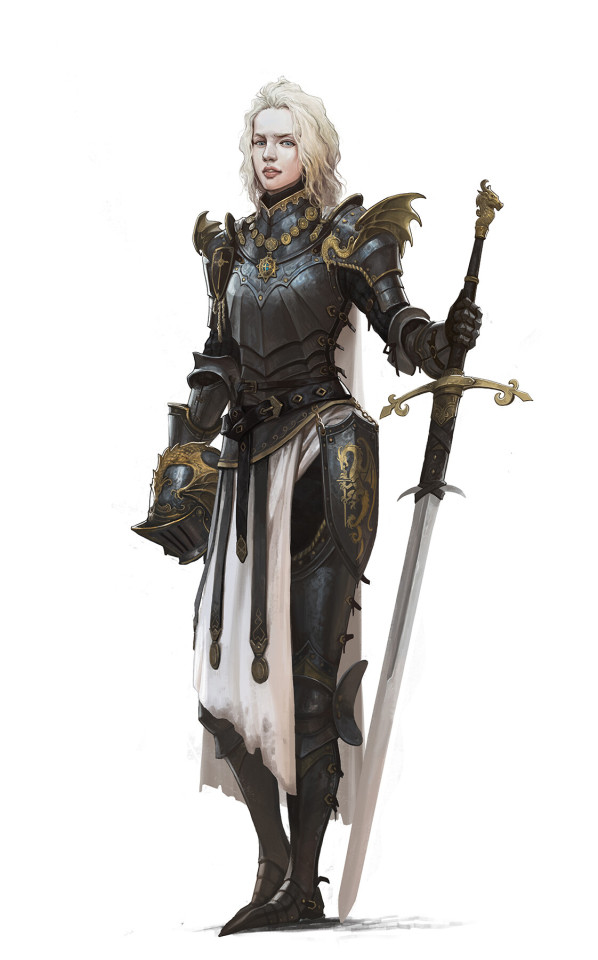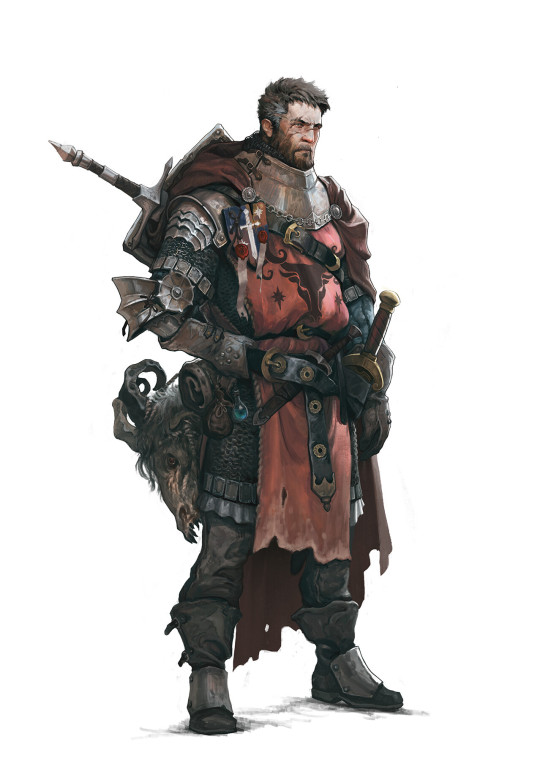Photo

SESSION 0!
Aah, the fabled “Session 0″. Many have chosen to ignore it and many have fallen prey to their folly. It is a session you hold before the actual start of the game in order to familiarize your players with the type of game you want to run, as well as adapt your plans according to their particular needs. I can not stress enough the importance of everyone around the table being on the same page in regards to the atmosphere, content and rules of the game. Time and time again I see people complaining about DMs running their own story without regarding the characters’ backtories at all. Or having homebrew rules that no one discussed that are being pulled out in the heat of battle, having dire consequences. Or the game being more combat heavy while the players just wanted to roleplay. All of that, and more, can be discussed beforehand so everyone knows what they’re buying into.
My second online campaign that I was a player in, I didn’t really enjoy playing. My natural proclivity is towards roleplaying and having meaning behind everything my character does. With that in mind I created an Artificer with an elaborate backstory and eventual mechanical servant to accompany him in his endeavors. I had a lot of things in mind to do with this character, with the end goal being inventing some grand invention to make my PC known throughout the lands. That would be the driving force of his actions.
When joining into this game, the DM only told all the players to create a character who, for some reason, ended up in jail, which they wanted to have as a starting point - I had no problems with that and incorporated it into my backstory. No other pointers were given.
As I found out a couple of sessions into the game, the DM had a story they wanted to run and any major detour would simply be turned down and squashed. They simply wanted players to play “their” game. This, naturally, resulted with me being unhappy for the majority of the campaign. My character had next to no motivation to follow the DM’s plotline and was just kind of tagging along. I was given no opportunities to “invent” something, tinker with my equipment (no pun intended) or even explore my class’ features. In fact, maybe a couple of sessions in, it was decided that having the mechanical servant with the party is too much of a hassle to deal with, due to frequently having to travel on a ship and the servant being too heavy for the ships, so it ended up being left behind in some city and pretty much unused. I was not happy.
Now, I’m not saying the DM was a bad DM or that their story wasn’t great. It was actually quite interesting and playing with them at the reins was indeed fun. If only we had discussed the nature of the campaign beforehand. If I were only given a heads up about the nature of party travel that would prohibit me from using my mech servant (which is about a third of the Artificer class), I would have gone with a different character and different expectations and would’ve had much more fun. This is why session 0s are held.
But what specifically is to be discussed in these preparatory sessions?
ATMOSPHERE
If you’re going into the Curse of Strahd adventure published by WotC, you should know that the setting is dark and gloomy, everything is sort of depressed and not much levity is to be had. Don’t go into it expecting fart jokes, memes and puns.
On the other hand, if the DM and the whole group agrees and wants to intentionally take the opposite aproach and make fun of how the adventure is written, more power to the whole group. My point is, that is something that should be discussed. Atmosphere is important.
THE THREE PILLARS
Any dnd veteran will tell you that the three pillars of dnd are combat, exploration and social interaction, However the DM wants to run the game or the players play it, whether it be more combat heavy, social roleplay oriented or based on a hexcrawl, everyone should be on the same page before starting. You don’t want to go Ranger with a focus in surviving in the wilderness, gathering food and tracking animals, and then finding out the campaign will mostly be held in a city and based around political conflict.
HOMEBREW
Whether it be rules that are not official or a setting where there are no humans, all homebrew material should be brought up before the campaign starts. No one wants to create an arcane spellcaster class and find out in game that magic doesn’t work due to some great devastating magic war a thousand years ago. The DM might even have a way for spellcasting classes to be able to cast spells or maybe plans for them to be the ones who discover magic again throughout the storyline of the campaign, but players should be aware of this before they start playing.
LEVELING AND CAMPAIGN LENGTH
This is a tough one. These days, while games are much more accessible via online platforms, they are also more prone to disbanding before their natural ending. It is hard to predict whether a game will last as long as it is supposed to. When there were fewer options and most games were held in person, everyone put in an extra effort to have the game continue.
Having said that, players should know what they’re getting into because it informs their choices of character creation. Maybe someone wants to play a class because of that one awesome ability they get at 14th level. If the campaign starts at 1st and ends at 10th, naturally, that player would not choose that class.
Also, how will leveling be done? Standard XP system or nowadays more popular milstone system? Each have their pros and cons, but whatever you decide to go with, you should let everyone know beforehand.
OTHER
Other than what was already mentioned, anything else that you would like to be known. No phones at the table, no being late, no talking out of character, no metagaming, whatever the DM or the players hold important, should be made aware to everyone at the table.
Now, all of this is maybe not so important when playing with friends you’ve known for a long time, especially if you’ve already played with them. But it is imperative for online games or games where you sit at a table without knowing the other people present. Trust me, when everyone’s on the same page, everyone’s happier. And that doesn’t mean that compromises can’t be made. Maybe the DM wants to try that critical fumble table for injuries and worse, but the players don’t - you talk it out and find a consensus. Dnd is a collaborative game, so collaborate - even before the game starts ;)
In the campaign my friends and I tried starting before the current one, we were still newbies and neglected to have a session 0, which resulted in a TPK in the first session and a few member changes for the eventual game we are currently playing for almost 2 years now. But that’s a story for another day.
Thanks for reading, as always, hope you’ve gained some inspiration ;)
1K notes
·
View notes
Text
The B.O.L.O.G: A Big Ol’ List Of D&D Generators...
Ladies, Gentlemen and Everyone and Everything in-between, I present to you: The B.O.L.O.G, or the“Big Ol’ List of Generators”, something I’ve been working on for a long time.
The “Big Ol’ List Of Generators” (or B.O.L.O.G for short!) has pretty much everything, with over 100+ DM and Player Tools, Random Generators, Cheat Sheets and Reference Sheets to help take your DnD Games to the next level!
Eigengrau’s Generator
Procgen Mansion Generator (with 3D Visuals & Floorplans!)
Chaotic Shiny
rollforfantasy.com
D&D DM Tip Generator (Sly Flourish)
D&D 5e Mob Damage Calculator (Sly Flourish)
DND Speak
Random Potion Generator for D&D (GeekNative.com)
donjon.bin.sh
Azgaar’s Fantasy Map Generator
Watabou Medieval Fantasy City Generator
5eTools
5eMagic.Shop (Magic Shop Generator w/ Items and Prices)
D&D 5e Tools by Leugren
JenniferBrussow.com (D&D Library Generator)
dnd5espells.rpglist.net (D&D Spell Scroll Generator)
RPG Tinker (NPC Generator)
Mithral and Mages (5e Treasure Generator)
Site of Many Things (Random Magic Item Generator)
Kobold Fight Club (Encounter Builder and XP Calculator)
DM Heroes (NPC Generator)
Here Be Taverns (Tavern & Menu Generator)
Instant Tavern Generator (WoTC)
Red Kat Art DnD5Tools
Myth Weavers Dungeon Generator
Not Another Tavern Generator
Goblinist.com (Random Encounter Generator)
FantasyNameGenerator.com
FastCharacter.com (Character Creator)
Tetra-Cube.com (Random Character Generator)
ChaosGen.com RPG Tools
AutoRoll Tables - Github
Indie Loot Generator for D&D 5e
Kassoon D&D Tools and Generators
Sane Magic Item Prices
Weak Magic Item generator
Watabou’s One Page Dungeon Generator
D12dev
Fantasy Calendar Generator
Drugs for D&D
Poison Generator
ancientquests.com
thievesguild.cc
5thdnd.com
John’s Dungeons and Dragons Tools
enneadgames.com
springhole.net
roll1d12.blogspot.com
seventhsanctum.com
npcgenerator.com
dungeonmastersvault.com
Random Spell Scroll Generator by u/Zwets
What Do You Want? (a Character Motivation Generator) by FencedForest
Maze Generator
NPC Generator by theunburnedwitch
Cafe Arcane (D&D Tools)
Worldbuilding: Clothing and Fashion (HumanVariant)
Slyscript’s Glossary of Archaic Words
Vulgar: A Fantasy Language Generator
Megacosm Generator
The 100 Most Important Things To Know About Your Character
Nonsense Generator
Tree Description Generator (by ModernBarbarian)
Overflower (A Flower Generator by Bleeptrack)
Tiny Quests for Tiny Goons
Magic Carpet Generator (by Zoyander Street)
Potion Description Generator (by Piecewise)
The Monsters Know What They’re Doing
D&D Swarm Damage Calculator
Monster Manual Encounters (Reddit)
MapGen4 (from Red Blob Games)
Random Inn Floorplan Generator (by Inkwell Ideas)
Instant Dragon Generator (by WOTC)
TabletopAudio (Custom Soundboards and Presets)
Phanary.com (Soundboards and Presets)
Iron Arachne Culture Generator
Merchant Wagon Generator (GeekNative.com)
RPG Market Generator
Random Prophecy Generator (GeekNative.com)
TrollMystic Random Generators
RanGen Random Generators
Improved Initiative Tracker
Chicken Dinner’s Point Buy Calculator
Adventurer’s Codex
Hit Effect Description Generator
Maker’s Forge Games
1 Dot Villain Generator
MiniWorld’s NPC Generator (by Profession)
The Thieves Guild
D100 Tricks, Puzzles and Riddles
GiffyGlyph.com
Orteil’s Dungeon Generator
Character Goal Generator
Tavern Description Generator
Shipwreck Description Generator
Realm Description Generator
Quest Generator
Character Personality Generator
Forest Description Generator
Character Appearance Generator
Dragon Description Generator
Farmland Generator
House Description Generator
Fantasy Swear Word Generator
“A Wise Man Once Said…” (A Fantasy Quote Generator)
4K notes
·
View notes
Text
Low-level diplomatic incidents for your Dungeons & Dragons game:
Two villages on opposite ends of a great valley have become embroiled in a dispute over hunting rights that’s about to boil over into open war. Each community is flat broke and can scarcely field a dozen men-at-arms, but neither can bow out of the approaching confrontation without losing face. Both village leaders attempt to hire the party as a secret weapon; neither is aware that the other has also done so.
The local lord’s contemptible offspring has resolved to slay the dragon that lairs nearby. The townspeople, however, have secretly entered into a mutually beneficial arrangement with the dragon; they would prefer to resolve the situation without revealing the bargain, and ideally also without getting the awful brat killed and thereby sparking a vendetta that would likely result in real dragonslayers entering the fray.
The party is accosted by robed acolytes who declare that one of the party’s number is the Chosen One, destined to defeat their god’s foes. The god in question proves to be a very minor deity whose domain consists of a stream that’s been polluted by a nearby smelting operation. In response, the small god of the hill the mine is sunk into – who benefits from the miners’ propitiation – soon nominates their own Chosen One!
A gang of phantoms haunting the local graveyard have taken to holding nightly festivities so raucous, they’ve been declared a public nuisance. Being spirits, however, they’re immune to any force the townspeople (or the party) can bring to bear, and exorcism has thus far proven fruitless because – metaphysically speaking – they have every right to be there. How do you enforce a noise complaint against immaterial perpetrators?
An enormous sinkhole opens beneath the town courthouse and plunges the building deep underground. Upon investigation, the party discovers not a monstrous incursion, but a Deep Gnome geological expedition that’s become lost due to a math error and ended up much closer to the surface than they thought they were. They don’t really want to hurt anyone, but they also don’t want their mistake to become public!
12K notes
·
View notes
Text
20 “Totally Not Weird” Things To Say To Your Players...
As far as your character can tell, there is nothing unnatural about it.
The trap appears to be disarmed.
Do you touch it, or are you just looking?
Who goes first?
From what you can see…
This room does not appear to contain anything.
There’s no visible effect.
You don’t seem to spot any traps in the immediate vicinity.
As far as you would know…
You feel fine.
Can I see your character sheet a second?
Can you describe in a little more detail how you do that?
What order are you walking in?
It doesn’t seem to do anything.
Are you sure about that?
You can certainly try!
How close do you want to get to it?
By the way, where exactly are you all standing?
Before you fall asleep…
I need to borrow a few more dice for a while.
9K notes
·
View notes
Text
The Worst DM Advice
I’ve been DMing for about two years now. Some days I’m a pretty good DM. Some days I’m not. Still, it’s long enough that my experience DMing (combined with three years of consistently playing D&D as a player) has given me some sense of how to DM. And sometimes, that sense doesn’t align with “DM tips” that I see pretty commonly. Some of these tips are useful in some but not all circumstances. Some aren’t. All of them are things that are very bad to treat as universal advice.
So, without further ado, the worst DM advice I’ve seen on the internet.
Never say no to your players
This advice is very common, and I think it comes from the “D&D is basically improv so you should always ‘yes and’” school of thought. And in many cases, this isn’t bad advice. If you’re finding you’re saying no to your players frequently, you should probably whether you’re being too restrictive and railroad-y. If your players are asking to do things that are maybe feasible but unexpected or unusual, most of the time, you probably should come up with an appropriate check for them to make (possibly with a high DC) and give them a chance to succeed.
So “rarely say no to your players” isn’t bad advice. But if you have DMed much at all, even if you are the most permissive DM in the world, I promise that you’ve said no to players plenty of times.
Why is this? Because players frequently ask to do things that are against the rules because they’re unclear on the map or the rules or some other aspect of the situation. Think of exchanges like “Can I get in melee with the monster?” “No, it’s 40 feet away, and your move speed is only 30 feet” or “Can I cast this spell?” “No, it takes an action to cast, and you already used your action this turn.” In these cases, it doesn’t make sense to answer yes. It doesn’t even make sense to say “no but”. You simply say no, give a brief explanation why, and move on. D&D is a storytelling mechanism, but it’s also a game, and as DM, you’re the referee. Sometimes you’re going to have to say no.
This also applies when a player asks to do something that technically doesn’t violate a rule, but seems physically impossible, absurd, or otherwise infeasible. In a more comedic game or a not so serious one-shot, you can let the player roll for it, letting them succeed gloriously on a very high roll and fail (perhaps hilariously) otherwise. But in a more serious game, especially if it’s part of an ongoing campaign, it’s totally fine to just say no. For example, I once ran a one-shot at a convention where a player asked if he could recruit an army of crabs while the party was taking a short rest along the coast. Because it was a one-shot where we were already playing fast and loose with rules, I said yes, he rolled a nat 20, and he got a bunch of crab minions for the final boss fight. It was a lot of fun, but I wouldn’t allow it in a campaign if the player didn’t have an ability to charm or control animals for a number of reasons. It would set a weird precedent, it would throw off the game balance a bit, and it would break the realism of the world if a level 1 could suddenly have animal minions by just being very charismatic. These, in my mind, are all good reasons to say no.
This, by the way, also goes for character builds. I would do this sparingly, but if you want to ban certain classes or spells or alignments (or whatever else you might want to ban), that’s okay. For example, my first campaign was shortly after 5e came out, and the DM didn’t want to figure out how metamagic would affect the game, so they decided sorcerers didn’t exist in our campaign. I as a DM have yet to ban anything mechanical, but I all but banned evil characters in my main campaign, because I didn’t want more troubles getting my party to work together on a common goal. In both cases, it was fine, and all the relevant players had plenty of character options. The more you get away from “core” options, the more this applies. Does your player want to play a homebrew class that either seems unbalanced or doesn’t really fit your campaign setting? Does your paladin want to multiclass into sorcerer for mechanical reasons even though the character has no arcane inclinations and hasn’t shown any signs of sorcery? If the player really wants it, you can try to work with them, but if that’s going to be too much work, just say no.
If players have fun, the DM has fun
This is almost more adage than advice, but I find it really harmful. First off, I will say that the inverse is true. If your players aren’t having fun, you’re probably not going to have fun, and if you are, that’s something you should probably work on. That said, games can look pretty different from the DM’s perspective and the players’ perspectives, and that disconnect means there’s all sorts of ways for players to have fun while the DM doesn’t. Maybe the players make fun of NPCs that the DM invested energy in. Maybe they find a way to breeze through combat, and the DM doesn’t ever get the chance to really use any of the monsters they wanted to use. Maybe players are repeatedly avoiding paying attention to the main plot of the game that the DM has invested time and effort into.
Sometimes these things can be fixed by an attitude adjustment. (Are players really breezing through all of combat or did they just find a way to destroy one monster you were really excited about?) But sometimes they can’t, and if you don’t do anything, you’ll grow resentful of the game, and then your players stop having fun. So in these cases, don’t just assume that everything is fine as long as your players are having fun. Talk to your players about the problem. Maybe it will mean they have to adjust their behavior, maybe it will mean you have to adjust yours, but either way, it can stop the problem from getting worse.
For example, my players have a tendency to ask hyperspecific questions that pick at the worldbuilding. (Recent ones include asking precisely how Speak with Animals works and why Scrying is legal and what the implications of that are.) Since I don’t tend to build up a ton of information about my homebrew world, and most of these questions aren’t directly relevant to the game, these tended to derail the game and stress me out by giving me more work that didn’t really progress the game. Eventually, I just talked to my players, and they agreed to try to to stop. It hasn’t stopped them entirely, but usually when they start to get into one of these discussions, one of the other players will cut them off.
You must make permadeath a serious threat
I see a lot of variants of this one, but basically they all amount to the idea that you should change some aspect of the game (rules or stories) to make death and/or permadeath more common than it typically is in 5e. Some of these suggestions, like making resurrection spells involve a skill check that can be failed, are perfectly reasonable rule change. Some of them, like banning Healing Word to make death more common in combat, feel overly draconian. Some of the story suggestions, like never basing plot points around specific characters in case they die, prioritize making the players afraid of death over every other aspect of the game and should probably be avoided.
But while some of these rules variants are reasonable and some aren’t, what I really want to say is that you don’t have to play with any of them. Hell, you can even guarantee resurrections at low levels when players wouldn’t normally have access to resurrection, and it won’t hurt your game. There seems to be a lot of worry in the RPG community that easy resurrection cheapens death, but ultimately, players know that death isn’t cheap. Even if the players know they have plot armor, the characters don’t. And ultimately, many players would rather not have their characters permadie. I know I wouldn’t.
Because the truth is that even if you absolutely guarantee resurrection in every circumstance, there’s still a lot of ways that death can rattle your characters. Aside from the fact that players are very likely to assign significance to their characters’ deaths, there’s a lot of things you can do as a DM. Maybe the cleric resurrecting the character learns some secret about the character as part of the ritual. Maybe the character “comes back wrong” and is missing some memory or skill they previously had. And ultimately, if the character is really blasé about their own death, doesn’t that also say a lot about the character?
Don’t start your game in a tavern
I can’t believe I have to say this after, say, Critical Role’s second campaign started in a tavern, but I see this advice in a few places, so I feel the need to say that it’s totally fine to start your game in a tavern. It’s a cliche for a reason. A tavern is a place where a variety of characters might be, and it’s a great place either for a quest giver to enter looking for adventurers or for something to go terribly wrong that requires the response of people inclined to do big heroic things. And just because starting in a tavern is cliche, that doesn’t mean that the campaign as a whole is. Aside from my Critical Role example, I’ve had two campaigns (my first ever campaign and the current one that’s being podcasted) start in taverns, and they’ve both been very original, a lot of fun, and very different from each other.
This same thing goes for any “Don’t do X, it’s too cliche” advice. Evil cults are common villains in D&D games, because evil cults make good villains, and giant fights with evil cults in the middle of creepy dungeons are fun. It’s more than okay to include those in your game. Similarly, the Forgotten Realms might be the most “boring” canon setting, because it’s straight up the middle high fantasy, but it’s also a very useful (and well-developed) campaign setting because it’s straight up the middle high fantasy. Ultimately, not every aspect of your game is going to be highly original, and that’s probably a good thing. Classics are classics for a reason, and it’s more important for your campaign to be engaging than original.
Never say “I don’t know”
Honestly, any advice that begins with “never say” is probably bad, but I think this one could be particularly stressful to new DMs. Every so often, your players are going to ask a very specific, unexpected worldbuilding question. Maybe you’re Matt Mercer and know offhand what the tax structure of the city is or exactly which drugs are popular in the region, but chances are you haven’t prepared your world in that level of detail. This advice says that you have to come up with an answer on the spot instead of admitting that you don’t know the answer offhand or else your world will feel less real.
It’s true that it probably breaks immersion to have gaps in the world. And it’s true that if you have a really good sense of your world and/or are very good at improvisation, you should try to answer when asked. But ultimately, a poorly thought out, unresearched answer is also going to make your world feel less real and will probably only lead to more questions. If you can’t think of a good answer, it’s okay to say that you don’t know.
That said, you should try to get an answer to your player in the end. If it’s something that’s hard to answer because you are lacking real world expertise that a player has, you might let them answer. (For example, if your player is a chemist playing an alchemist and they ask how one of their concoctions work, your answer might be “I don’t know, you tell me”.) If it’s something that requires a little bit of thought but is tied to the plot of the game, take some time after the game and tell your players the answer at the start of the next session (or message them between games with the answer). Finally, in some cases, a player really will ask an offhand question that’s hard to answer. In that case, it’s totally okay to say you don’t know and ask if they really need to know the answer. There’s every chance they’ll say no, and you can move on. Not every tax structure needs to be delineated in full.
Anyways, despite this being a very long post, that’s probably just a few of the really bad pieces of advice out there, and I’d love to hear if people have others.
2K notes
·
View notes
Text
Random mansion generator
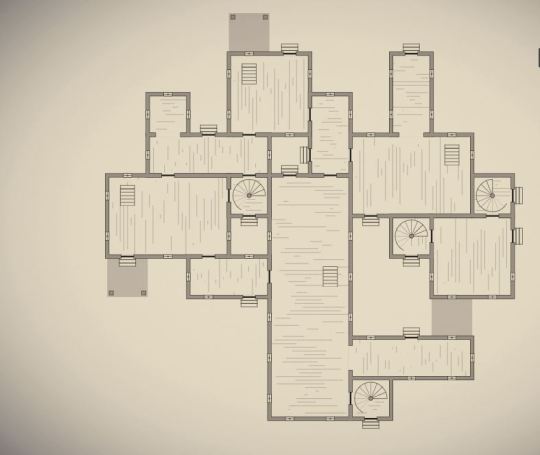

The Procgen Mansion Generator produces large three-dee dwellings to toy with your imagination, offering various architectural styles and other options. Each mansion even comes with floorplans:
https://boingboing.net/2019/07/12/random-mansion-generator.html
231K notes
·
View notes
Text
yes, I’m a DM, yes, I love writing, no, I don’t know how distance works. Is that building 100 feet away or 40 feet away? Should you be able to see something ten minutes down the road? Is 1,000 feet long? Is 30?? Is 6??? Could you walk across the continent in 2 weeks or 2 years? I hate this. I hate travel. I hate measurement. Fuck you.
26K notes
·
View notes
Link

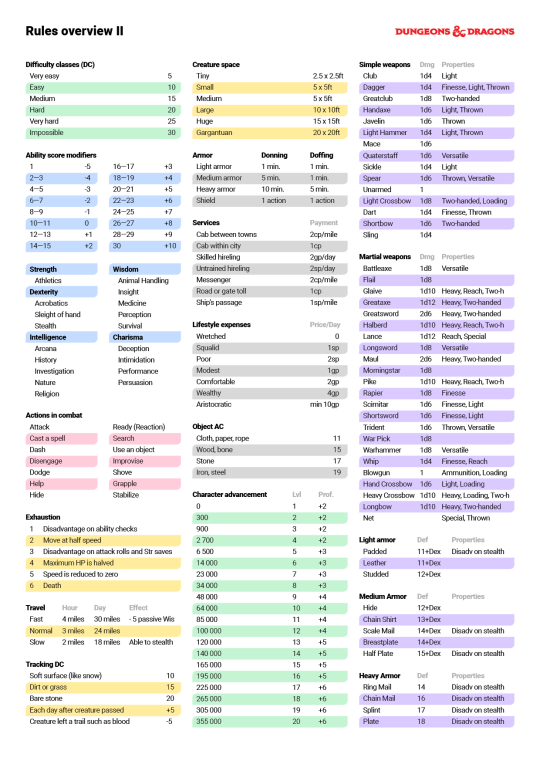
So this is a cheat-sheet I’ve made for personal use to just have an overview over all the basic D&D rules. The first page covers most of the text rules. The color divides the sections more or less from one another.
The second page covers most of the important tables and stats, that you’ll probably need through the game. Hope you like it and find some use for this! Cheers.
46K notes
·
View notes
Text
I am BUYING DICE and organizing my first dnd game. I’m planning on running a oneshot just so we can all figure out the game mechanics and then running a longer adventure. You people know way more about this than I do, so any tips for first time players / DMs?
3K notes
·
View notes
Text
Rations for various RPG Races
[[ Source. Original creator: wats6831. Additional information and images linked under each one. ]]
Universal:
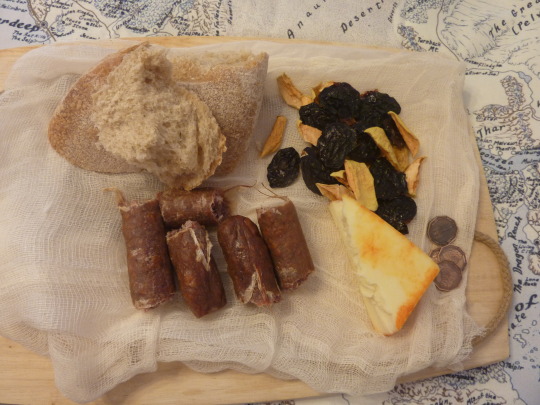
Homemade artisan herb bread, home grown and dried apples and prunes, uncured beef sausage, munster cheese. Made a small bag from cheesecloth and tied it closed.
Discussion thread here.
Dwarf:

Garlic chicken livers, smoked and peppered cheese, spiced pork sausages, hard tack, dried vegetables, dried wild mushrooms.
Discussion thread here.
Elf:

Top left to right: Evereskan Honey Comb, Elven Travel Bread (Amaretto Liquer Cake with custom swirls), Lurien Spring Cheese (goat cheese with garlic, salt, spices and shallots), Delimbyr Vale Smoked Silverfin (Salmon), Honey Spiced Lichen (Kale Chips), and Silverwood Pine Nuts.
Discussion thread here.
Halfling:
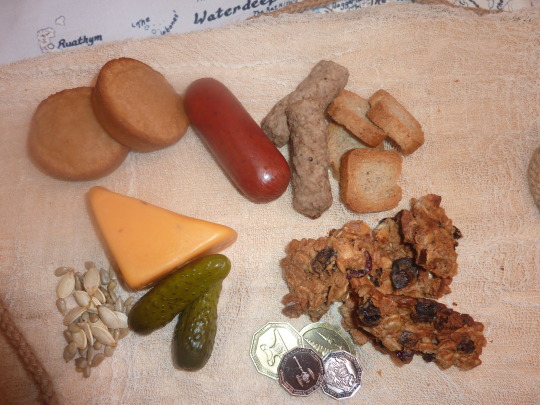
From upper left: “Honeytack” Hard tack honey cakes, beef sausage, pork sausage mini links, mini whole wheat toast, cranberry cheddar cheese mini wedge, mini pickles, pumpkin and sunflower seeds, lower right is my homemade “travel cake” muesli with raisins, golden prunes, honey, eggs and cream.
Discussion thread here.
Half-Orc:

Wrapped in cheesecloth and tied in burlap package. Forest strider drumsticks, molasses sweet wheat bread “black strap”, aged Munster, hard boiled eggs, mixed wild nuts.
Discussion thread here.
Orc:
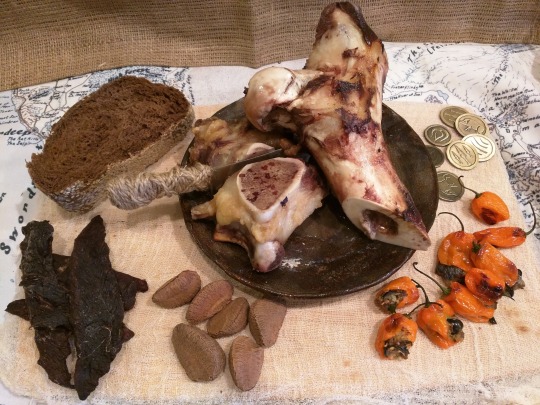
Orcs aren’t known for their great cuisine. Orcs prefer foods that are readily available (whatever can be had by raiding), and portable with little preparation, though they have a few racial delicacies. Toughs strips of lean meat, bones scavenged from recent kills, and dark coarse bread make up the bulk of common orc rations.Fire roasted rothe femur (marrow is a rare treat) [beef femur], Strips of dried meat (of unknown origin) [homemade goose jerky], foraged nuts, only edible by orcs….nut cracker tusks [brazil nuts], coarse black bread, made with whatever grains can be pillaged [black sesame bread], Pungent peppers [Habanero peppers stuffed with smoked fish and olives].
More images here. Discussion thread here.
Gnome:
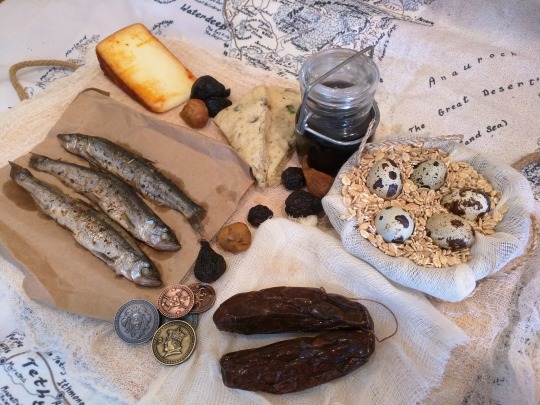
Pan fried Delimbyr smelt, spiced goat cheese (paprika crusted hand pressed Fontina), Gnome shortbread (savory pistachio), glass travel jar filled with Secomber Red (wine), hard boiled quail eggs packed in rolled oats (to keep safe), dried figs from Calimshan, and Southwood smoked goat sausage (blood sausage).
More images here. Discussion thread here.
Lizardfolk:

Lizardfolk are known to be omnivores, forage for a surprising variety of foods found within the confines of their marshy environs, in this case the Lizard Marsh near Daggerford. Fresh caught boiled Delimbyr Crayfish on wild chives, coastal carrageen moss entrapping estuary brine shrimp (irish moss, dried brine shrimp), Brackish-Berries (blackberries), Blackened Dart-Frog legs (frog legs) on spring sprouts (clover sprouts), roasted bog bugs on a stick!
More images here. Discussion thread here.
Drow:

From top left: Menzoberranzan black truffle rothe cheese (Black Knight Tilsit), Donigarten Moss Snails (Escargot in shallot butter sauce), Blind cave fish caviar in mushroom caps (Lumpfish caviar), faerzress infused duck egg imported from the surface Realms (Century egg), Black velvet ear fungus (Auricularia Black Fungus Mushroom).
More images here. Discussion thread here.
221K notes
·
View notes
Text
PC makes a good argument, but doesn't roll well enough to persuade
By all rights, the NPC should be convinced by what the PC says; but the dice say otherwise. Here’s some suggestions for how they could respond.
“You’re just trying to confuse the issue!”
“You made some good points, but I have my orders.”
“Wait, what about this incredibly minor detail in what you just said, we need to argue that point.”
“Yeah but consider this: I don’t care.”
“It’s good that you’re so concerned, but leave this to the experts.”
“I need some time to think about it.”
“That sounds exactly right! I need to go though, so good luck with everything.”
“If only things worked that way.”
“We’re too busy right now; come back later, when things should have calmed down.”
“It doesn’t matter what pretty words you use, I know that nothing you say can be trusted.”
“Forget that; this other issue is what really matters.”
“Sorry, what did you just say? I have a really bad headache, and it’s hard to concentrate on things.”
“I’m not even going to dignify that with a response.”
“Yep, I got it: here’s how I interpreted what you said, which is pretty far off from what you intended.”
7K notes
·
View notes
Text
Two universal constants of high fantasy living:
If something falls into ruin a necromancer will move in 100% of the time
There is a critical mass of gold that will summon a dragon. If you keep accurate records and stay below it you’ll be fine
71K notes
·
View notes
Text
List of resources for dnd
roll20: Make an account to play the game
Orcpub: For hosting and editing your character sheet
DND Wiki: Homebrew things, races, classes, misc
Players Handbook: Rules how to play how to make a character, all basic information for playing a game
Discord: to talk during and about the game
91K notes
·
View notes
Text
concept: elves are supernaturally good at everything ONLY because they live to be bonkers old and if you were hot and sexy for thousands of years you’d be kickass at archery and treeclimbing and horseback riding too. but like there’s 20 year old elves out there that are just straight dumbasses who can’t do shit.
concept: non-elves can’t tell the 20 year old elves apart from the 2000 year old elves
concept: there’s a 20 year old elf in your tavern and he’s counting on this
79K notes
·
View notes
Link
1. Freedom vs Safety
ex: Minority Report
2. Success vs Selflessness
ex: Mad Max: Fury Road
3. Progress vs Preservation
ex: Toy Story 3
4. Individuality vs Community
ex: Snowpiercer
5. Privacy vs Transparency
ex: The 100
45K notes
·
View notes
